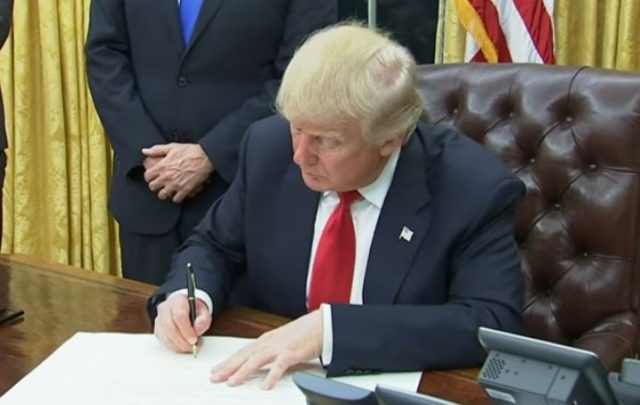 The Fourth Circuit Court of Appeals ruled on Thursday, upholding a district court’s injunction against enforcement of President Donald Trump‘s second executive order on immigration. The EO banned travel from six Muslim-majority nations (removing Iraq from a list that was part of a previous order), in order to give the administration time to review immigration standards and potentially put stricter policies in place. The order also called for a temporary bar on refugees entering the U.S., but removed an indefinite ban on Syrian refugees, which was in the original order.
The Fourth Circuit Court of Appeals ruled on Thursday, upholding a district court’s injunction against enforcement of President Donald Trump‘s second executive order on immigration. The EO banned travel from six Muslim-majority nations (removing Iraq from a list that was part of a previous order), in order to give the administration time to review immigration standards and potentially put stricter policies in place. The order also called for a temporary bar on refugees entering the U.S., but removed an indefinite ban on Syrian refugees, which was in the original order.
The court’s decision said that President Trump’s order “speaks with vague words of national security, but in context drips with religious intolerance, animus, and discrimination.” The court determined that the order appears to violate the Establishment Clause of the Constitution, recognizing that while the President does have the power to bar aliens from entering the country, “that power is not absolute.” As a result, the court held that the lower court acted properly in issuing a nationwide block against the executive order. That injunction was ordered with the belief that the plaintiffs will likely end up winning the case outright on the merits, and because they could suffer irreparable harm without an injunction.
Chief Judge Roger Gregory, in his opinion, referenced comments made by Trump while he was campaigning and also after taking office, which supported the belief that his executive order was religiously motivated. A concurring opinion agreed with Judge Gregory’s decision, but noted that it should only be based on comments made after Trump took office.
Judge Gregory was not convinced that President Trump’s order had a secular purpose. “The Government’s argument that [the order’s] primary purpose is related to national security … is belied by evidence in the record that President Trump issued the First Executive Order without consulting the relevant national security agencies.” Judge Gregory also quoted the President as saying that the second order was “a watered down version of the first order,” implying that its motivations were the same, even if its effects would be less drastic.
The Fourth Circuit did overturn part of the injunction. Judge Gregory ruled that the district court improperly applied it to President Trump himself, noting that the Supreme Court says such action should only be permitted “in the rarest of circumstances.” Still, the effect on the executive order should be the same, the court noted, because it injunction still applies to officials who would be enforcing it.
The Ninth Circuit also heard arguments in a case over a nationwide block of the order, but they have yet to rule. Should the Ninth Circuit reach a different conclusion than the Fourth Circuit, it would increase the likelihood of the case going before the U.S. Supreme Court. Given the nature of the case, however, with interests in national security at odds with religious freedom, the case could end up before the high court no matter what.
4th Circuit Decision by LawNewz on Scribd
Update – May 25, 5:42 p.m.: Attorney General Jeff Sessions said he’ll try to take this case to the U.S. Supreme Court.
JUST IN: AG Sessions on 4th Circuit Court of Appeals decision on revised travel ban: DOJ to "seek review of this case in" Supreme Court. pic.twitter.com/EWilzObbUf
— ABC News (@ABC) May 25, 2017